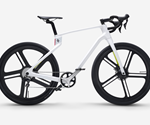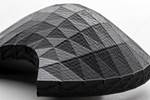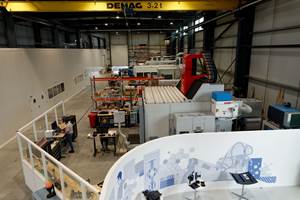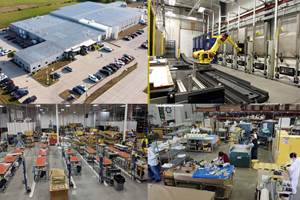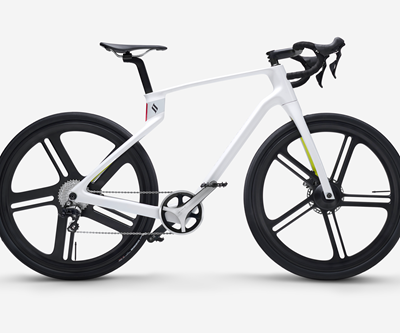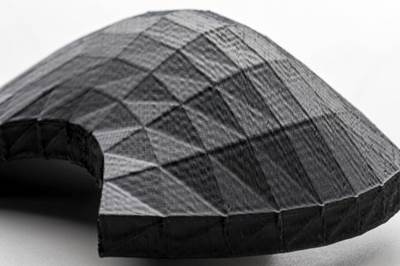Arevo debuts custom, 3D-printed composite scooter
Scotsman is a direct-to-consumer, tailor-made electric kickscooter with continuous carbon fiber/thermoplastic unibody frame, handlebars, stem and baseboard.
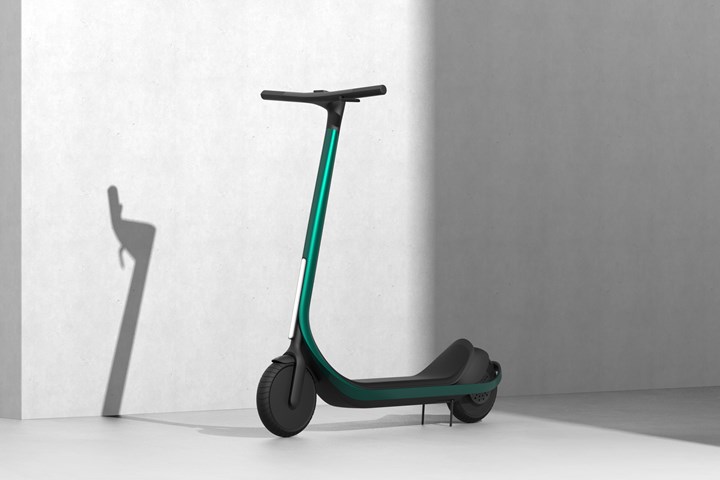
Photo credit, all images: Arevo
On May 26, additive manufacturing specialist Arevo (Milpitas, Calif., U.S.) launches , a new electric scooter brand whose flagship product is a custom 3D-printed, carbon fiber/thermoplastic composite electric kickscooter.
Scotsman’s entire unibody construction — frame, handlebar, stem and foldable baseboard — are 3D-printed with aerospace-grade Hexcel (Stamford, Conn., U.S.) carbon fiber and polyamide (PA), constructed seamlessly without joints or glue. Designed for impact resistance and durability, the composite frame is said to weigh 15-20 kilograms (33-44 pounds) plus the weight of the battery pack, which can be removed for lighter-weight transport.
Like Superstrata, Arevo’s 3D-printed carbon fiber/polyamide bicycle launched in July 2020, the Scotsman is a direct-to-consumer product manufactured at Arevo’s Vietnam-based manufacturing facility. Also like Superstrata, each Scotsman is tailor-made for the customer’s height, weight, arm and leg lengths, and riding position — a level of customization said to be a world-first within the scooter industry.

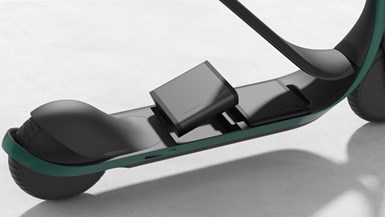
According to Sonny Vu, CEO of Arevo, the Scotsman’s design is intended to bridge the gap between bulky shared scooters and “toy-like” personal use scooters. Notes Josh Morenstein, founder of Branch Creative, the studio that worked with Arevo to design the Scotsman, “In designing the Scotsman, we wanted to elevate the scooter experience to a sophisticated alternative means of transportation that appeals to the urban professional commuting to work as much as the performance geek who wants the latest in electric mobility. Being able to 3D print in continuous carbon fiber composite enabled us to pursue designs not otherwise possible in other materials and fabrication techniques.”
Vu adds, “Scotsman has many features for consumers in terms of connectivity and different customization options, but from a materials perspective, it’s really quite an innovation. Soctsman shows the capabilities of using continuous fiber 3D printing for very complex, curved parts and pieces you just couldn’t make from a traditional lamination approach. You certainly couldn’t customize each scooter. You’d have to make multiple molded pieces that would have to be glued or welded together, adding weight and reducing the strength. We don’t do any of that. It’s just one piece coming out of the printer because our printer does prints up to a cubic meter.”
The current production facility in Ho Chi Minh City, which will be fully operational this summer, houses 76 of Arevo’s robotic direct energy deposition (DED), continuous fiber composite 3D printers, which Vu says will be capable of printing 2,000 bike/scooter frames per month, or about 1 Superstrata frame per machine per day, and a little faster for a Scotsman frame. He notes that a new, even larger facility, in Da Nang, Vietnam, will open next year housing hundreds of 3D printers for increased production capacity.

Additional high-end features of the Scotsman include:
- high-power motors (up to 2,000-watt output).
- dual motor system for added stability.
- dual regenerative brake system.
- proprietary composite suspension system.
- dual battery bay architecture for extended riding.
- quick release battery system that doubles as a USB-C powerbank to charge any devices.
- fully connected (always on GPS + cellular) riding experience, including Find My Scooter and Unlock features, and a built-in dashcam that has a Record My Ride feature.
“With Superstrata and now Scotsman, our goal is to demonstrate what we can do,” Vu says. “We’re putting out very good products, made at scale, and brought to market really fast.” He notes that Arevo plans to leverage the skills and knowledge gained from both products to manufacture bicycle, electric vehicle and other components in future as well using the company’s 3D printing facilities.
The Scotsman electric scooter will retail for $2,999 and is available for pre-order with special pricing now . Shipping begins in December 2021.
Related Content
Thermoplastic composites: Cracking the horizontal body panel nut
Versatile sandwich panel technology solves decades-long exterior automotive challenge.
Read MorePlant tour: Daher Shap’in TechCenter and composites production plant, Saint-Aignan-de-Grandlieu, France
Co-located R&D and production advance OOA thermosets, thermoplastics, welding, recycling and digital technologies for faster processing and certification of lighter, more sustainable composites.
Read MorePlant tour: Sekisui Aerospace, Orange City, Iowa, Renton and Sumner, Wash., U.S.
Veteran composites sites use kaizen and innovation culture to expand thermoplastic serial production, 4.0 digitization and new technology for diversified new markets.
Read More“Structured air” TPS safeguards composite structures
Powered by an 85% air/15% pure polyimide aerogel, Blueshift’s novel material system protects structures during transient thermal events from -200°C to beyond 2400°C for rockets, battery boxes and more.
Read MoreRead Next
Arevo launches direct-to-customer 3D-printed bicycle
The Superstrata brand features a fully unibody carbon fiber/polyamide frame manufactured using Arevo’s direct deposition additive manufacturing process.
Read MoreArevo composite additive manufacturing: the future of AFP?
Its multi-axis, continuous fiber technology eliminates tooling, matches strength of titanium parts at 1/3 the weight and cuts part cost vs. hand layup/autoclave cure by a factor of 5.
Read MoreScaling up, optimizing the flax fiber composite camper
Greenlander’s Sherpa RV cab, which is largely constructed from flax fiber/bio-epoxy sandwich panels, nears commercial production readiness and next-generation scale-up.
Read More.jpg;width=70;height=70;mode=crop)
